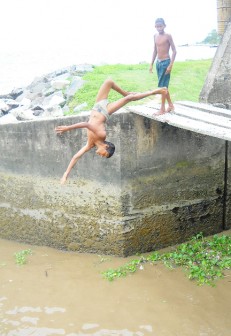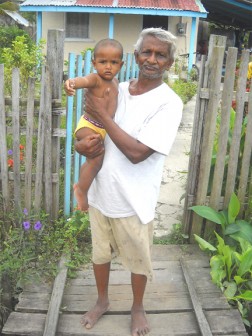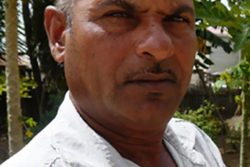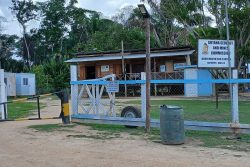Every weekday hundreds and hundreds of persons stream out, heading for the city, returning in waves at night. “Yuh going town” or “Stelling?” is the query that all minibus operators have to answer, because for many the final destination is their jobs in Georgetown. In the mornings most – except those with queasy stomachs – go to the Vreed-en-Hoop stelling because it is faster. At nights though, all return via the Demerara Harbour Bridge in an hour-long commute to one of the largest housing areas in Guyana.
Tuschen is a village of internal migrants. From a little rural community about a decade ago, the New Tuschen Housing Scheme has drawn thousands from various parts of the country eager to fulfil their dream of a home of their own. Now there are thousands of homes in the Scheme ranging from the palatial to little shacks covered with plastic.
“It arite,” says a woman; “Everybody living good here.”
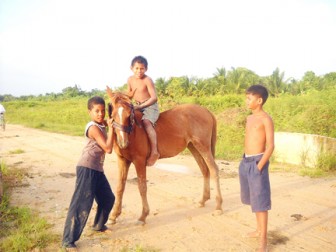
The East Bank Essequibo community bordered by Zeelugt to the east, Vergenoegen to the west, the backlands to the south and the Essequibo River to the north, is a two-part village: Tuschen North and the New Scheme. It is not possible to say approximately how many thousands make the community their home; the village welcomes new residents on a weekly basis. From Georgetown, the West Bank and Coast of Demerara, the East Bank of Essequibo, the Essequibo Islands, the new arrivals come, fashioning a modern community out of what was once an abandoned cane plantation.

“Since me been ah live here the village change a lot,” says Parbattie Persaud, 68. She has lived in the community for 60 years and said in the past not many people were living in Tuschen. “It was like estate houses, dem small houses…now it get nice road… long ago it was red-brick road,” she recounted. “When me small, train went running.” Persaud lives in Tuschen Old Road in the home where she has lived for years.
Most of the other Tuscheners are relatively new. Just over seven years ago, Andrew Ewart Haynes
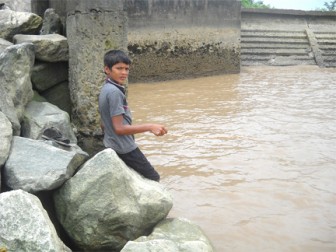
moved to the New Tuschen Housing Scheme from Parika. “I’m a born Essequibian,” the newspaper vendor said. He said that he could not acquire a house lot in another area and was “accidently” given a lot in Tuschen. Seven years ago too, Rameshwar Harricharan moved to the New Scheme from Greenwich Park, several villages away from Tuschen.
Some in Tuschen North who have lived in the community for decades remember when trains ran through the village. “The last day when train scrap, me go pun the train and get free ride. Whole day we get free ride,” recalled koker operator, Deen, 55. He recounted that back in those days travel was normally by rail from Vreed-en-Hoop to Parika since the road network
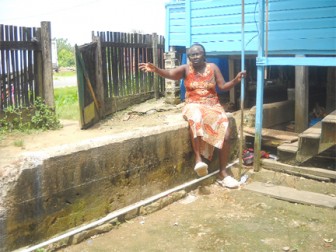
was not as well developed.
Pat Moore-Marks lives where the old train station was located. She too rode the trains. It has been 22 years since she moved there from another part of Tuschen.
But ask anyone their thoughts about the community, inevitably they zero in on issues of concern to them.
The roads are bad and the ones being resurfaced are not much better, Haynes says. The contractors are using “rotten mud,” he said. “As soon as water catch dah, it wash away.” Additionally, he pointed out that after being constructed several years ago, the Health Centre has not yet been opened, and water pressure is low. He noted that the Scheme
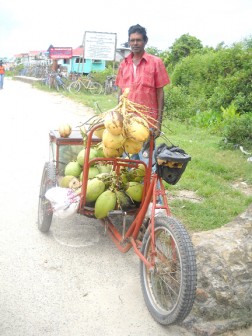
is being expanded and questioned how this will work out.
Haynes also said that there are a lot of petty crimes in the Scheme with thieves entering yards to pick up things despite the presence of a Community Policing Group. There are many bicycle thieves, he said. “As soon as you put down your bicycle, somebody gone with it.”
Additionally he pointed out that there is “dope-smoking” in the community while there are few social activities for youths and the playfields are not developed.”A big community like this ain’t got playground,” he exclaimed.
Teehal in Tuschen North said he was worried about the state of the bridge used to access the street where the Tuschen Nursery School is located. He is another internal migrant who was born and grew up in Leguan and farmed in the Bonasika Creek before moving to Tuschen several years ago.
For Harricharan, a coconut and greens vendor, the village is “okay” except for the cattle. “Every day they come in and bruk up the yard. They damage mi greens,” he said. “They damage you thing and they nah gat rope for you to catch and tie up.” He wants the authorities to clamp down on cows. “The place is okay but it got a lot of thief-man too,” he added saying too that the rural constables “harass” people. Harricharan was also feeling the blues in his personal life as well. “Well right now, me and me gyal get problem and she gone by she mother. Hopefully she gon come back,” he said.
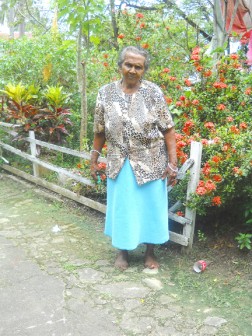
With the explosion in the population, businesses have increased in the community. There are a number of general stores, hardware stores, three lumberyards, a furniture plant, mechanical and vulcanizing shops, and various other businesses ranging from barber shops to a doctor’s clinic as well as internet cafes, restaurants and the ever-present rum shops. There is also a guest house and the well-known Double Day International Hotel with the community’s only swimming pool.
There are also temples, mosques and numerous churches in Tuschen as well as a newly-constructed primary school and a nursery school. Towers from both phone companies are visible, while there is also a post office.
“The majority of things you could pick up here,” Haynes said, adding though that he would like to know when the relevant authorities would take over the scheme so that residents could pay their rates and taxes and get a proper service.
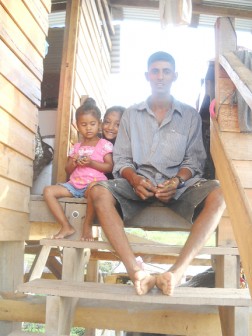
Many have come to Tuschen having encountered difficulties in housing elsewhere, and were glad for an opportunity to get a piece of land they can call their own, often battling against different odds just to put a post in the ground.
For Chandrowtie Mohammed it is all about the dream of her own home. She and her four children live in a little wooden dwelling with a tarpaulin roof in the newest part of the expanding Scheme. ”Me cyan afford to put zinc,” she said. She has been living there for about a month now after moving from Meten-meer-Zorg.
She is happy for the land but it is really hard, the frail looking woman said. Her husband died in 2003 and she has to maintain her four children by herself and at the moment she is unable to find a job.
Her two eldest children Tulsidai Harnauth, 13, and Ajay Harnauth, 14, are not attending school, having left when they were in Grades Four and Five. The outgoing children explain what happened. “We don’t have money to go to school,” Tulsidai says. “When the house done build, she gon try foh send we back to school, she adds hopefully. “We want foh go back to school… we does still pick up a book like foh read like.”
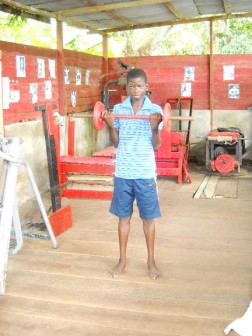
Tulsidai explained that she dropped out when she had to move on to a new school because they could not afford the uniform. “Me nah been get the money foh send them to school cause the rent dey kill me out,” says Mohammed. “Me looking for a work but me ain’t getting a work nowhere,” she said. Mohammed said that she used to be a domestic worker and is willing to “do any kind of work you can think of.”
Mohammed is one of the first who came to live in Phase II of the Tuschen New Scheme. It is relatively undeveloped and Mohammed Shaheed complained of the lack of running water and electricity and also thieves, while the road, he said, is virtually impassable when it rains. He said that the utility, Guyana Water Incorporated, say that they will connect the water only when the government hand over the pipes to them. Shaheed and his family of three use the trench for bathing and washing but he has to bring water from Phase I for cooking and drinking. “Everyone glad for a land foh build their house,” he noted though.
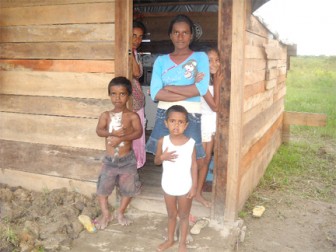
The village is changing daily. Deen recalled that back in 1976, he was one of the first persons to squat in Tuschen North, “a nice, breezy area” which was eventually regularized. “We develop the land here weself,” he said. A little bay at the Tuschen foreshore with a little sandy beach was once land, he recounted. “People use to come and dig brown sand to use to make houses.” Erosion took hold forming the little bay.
Moore-Marks has lived at the Old Railway Line in Tuschen for the past 22 years having previously lived in a different part of Tuschen. The community is a quiet multi-cultural area, she said; “Every religious holiday everybody come
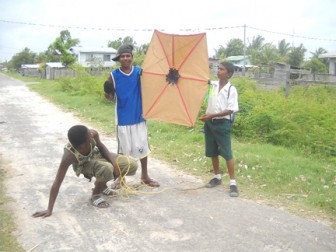
together as one and celebrate. We don’t have any race [issues] here.”
Even as the population spurts and new strangers come in every day, the community still retains a rural charm. Here youths play cricket on the road, football too as well as hopscotch and other games little children think of, stopping only to let the increasing number of hire-cars working there to pass. The ‘blacka’ at the back provides swimming while farmers cultivate the backlands, though some say they too encounter difficulties there with infrastructure.

As the old sugar plantation evolves, the fact that it is home will always remain for some. “We born and we grow here and mek children here,” says Eleen Babb, the elderly lady sitting in a chair on her verandah on the Old Railway Line. “But it getting hot.”
